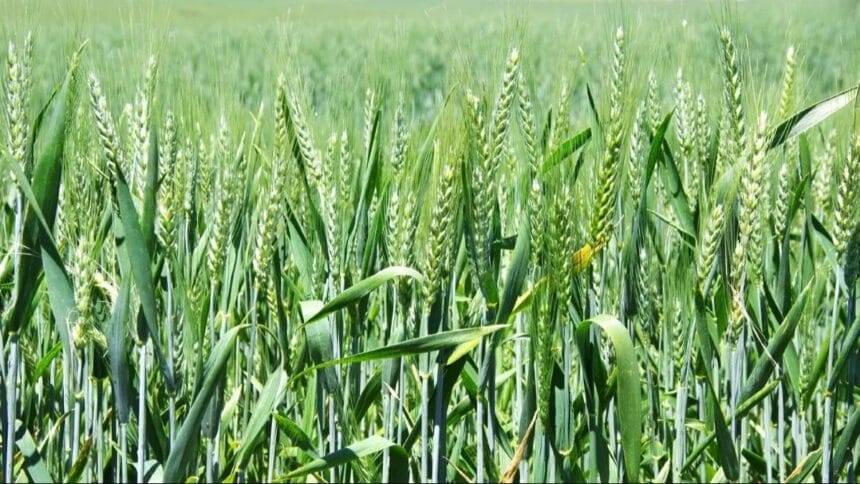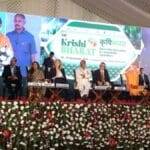Main Points In Hindi (मुख्य बातें – हिंदी में)
यहाँ पर आप दी गई सामग्री के मुख्य बिंदुओं को हिंदी में प्रस्तुत कर सकते हैं:
-
जलवायु परिवर्तन का प्रभाव: नवम्बर में असामान्य रूप से उच्च तापमान महसूस हो रहा है, जिससे किसानों में चिंता बढ़ रही है। यह तापमान रबी फसलों, खासकर गेहूं और सरसों की पैदावार पर नकारात्मक असर डाल सकता है।
-
गुजरात में सॉइंग में कमी: गुजरात में रबी फसलों की सॉइंग पिछले वर्ष की तुलना में 47% कम हो गई है। उच्च तापमान के चलते किसानों को सावधानी बरतने और फसलों की सॉइंग रोकने की सलाह दी जा रही है।
-
फसलों के लिए तापमान की आवश्यकता: रबी फसलों की उचित वृद्धि के लिए तापमान 25 से 30 डिग्री के बीच होना आवश्यक है, लेकिन वर्तमान में तापमान इससे अधिक है। इससे फसलों के अंकुरण पर नकारात्मक प्रभाव पड़ सकता है।
-
किसानों को सलाह: किसानों को सलाह दी गई है कि यदि फसलें बोई गई हैं, तो उन्हें स्प्रिंकलर विधि से सिंचाई करनी चाहिए। इसके अलावा, सॉइंग तब तक न करें जब तक कि तापमान उचित स्तर पर न पहुंचे।
- विभिन्न प्रकार की विसंगतियाँ: मौजूदा मौसम में अधिकतम तापमान, अधिक वर्षा, और गर्मी के कारण रबी फसलों की सॉइंग में देरी हो रही है, जिससे सब्ज़ी फसलों को सबसे अधिक नुकसान हो रहा है।
Main Points In English(मुख्य बातें – अंग्रेज़ी में)
Here are the main points derived from the provided text regarding the impact of climate change on agriculture, specifically in Gujarat:


-
Unseasonably High Temperatures: November has seen uncharacteristically high temperatures, with daily temperatures reaching around 34 to 36 degrees Celsius, adversely affecting the growth conditions for Rabi crops which typically require cooler temperatures.
-
Decrease in Crop Sowing: In Gujarat, Rabi crop sowing is lagging significantly, with an area of 3.08 lakh hectares sown, which is a 47 percent decrease compared to the previous year. This delay in sowing is attributed to the impacts of climate change.
-
Advisories for Farmers: Due to the high temperatures, the Gujarat Agriculture Department has issued advisories recommending that farmers halt the sowing of Rabi crops until temperatures drop to suitable levels (between 25 to 30 degrees Celsius). If sowing has already occurred, farmers are advised to irrigate their crops using sprinkler methods.
-
Wider Agricultural Concerns: The abnormal weather patterns, including increased summer temperatures and excessive rainfall during the monsoon, have resulted in significant damage to vegetable crops and are raising concerns about the viability and growth of Rabi crops.
- Potential Risks to Crop Growth: The ongoing high temperatures pose a risk to the germination and overall growth of Rabi crops such as wheat and mustard, prompting worries among farmers about the long-term effects of climate change on their yields.
Complete News In Hindi(पूरी खबर – हिंदी में)
जलवायु परिवर्तन का प्रभाव साफ नजर आ रहा है। नवंबर के महीने में जब ठंड होनी चाहिए, लोग पंखे चलाकर सो रहे हैं और गर्मी महसूस कर रहे हैं। यह जलवायु परिवर्तन का असर है। इसका प्रभाव कृषि पर भी देखा जा रहा है। अगर नवंबर में अच्छी ठंड होती है, तो रबी फसलों की वृद्धि अच्छी रहती है। खासकर गेहूं और सरसों को इससे फायदा होता है। इन दोनों फसलों की बुआई कई स्थानों पर चल रही है या अब भी अंकुरण की अवस्था में हैं। ऐसे में उच्च तापमान इन रबी फसलों के लिए घातक साबित हो सकता है।
नवंबर में उच्च तापमान और गर्मी का अहसास कई फसलों के लिए अच्छा संकेत नहीं है। इस मामले में गुजरात से सबसे बड़ी चिंता आ रही है, जहां फसलों की बुआई में कमी की खबरें हैं। गुजरात के कृषि निदेशक ने बताया कि इस बार राज्य में रबी फसलों की बुआई 3.08 लाख हेक्टेयर में हुई है, जो पिछले वर्ष की तुलना में 47 प्रतिशत कम है। यह जलवायु परिवर्तन के कारण मौसम पर पड़ने वाले असर के कारण हुआ है।
गुजरात में पिछड़ी बुआई
यह पहली बार है जब गुजरात में किसानों को सलाह दी गई है कि वे रबी फसलों की बुआई रोक दें। कृषि विभाग ने कहा है कि अक्टूबर और नवंबर में दैनिक तापमान 34 से 36 डिग्री के बीच है, जो रबी फसलों की बुआई के लिए अच्छा नहीं है। बाकी राज्यों की बात करें जहां किसानों ने रबी फसलों की बुआई की है, वे चिंतित हैं कि अगर तापमान नहीं गिरा और ठंड नहीं बढ़ी तो उनकी फसलों का क्या होगा।
गुजरात कृषि विभाग के अधिकारियों ने बताया कि चना, सरसों, लहसुन, जीरा, गेहूं, धनिया और प्याज जैसी रबी फसलों के अंकुरण के लिए तापमान 25 से 30 डिग्री होना चाहिए। लेकिन वर्तमान में तापमान इससे अधिक है। ऐसे में इन फसलों की बुआई तब तक नहीं करनी चाहिए जब तक यह तापमान नहीं आता। हाल ही में गुजरात के उप निदेशक भवेश पटेल ने कहा कि वर्तमान में दिन का तापमान अंकुरण के तापमान से अधिक है।
किसानों के लिए सलाह
आमतौर पर नवरात्रि के बाद तापमान गिरने लगता है और दीवाली तक ठंड पूरी तरह सेट हो जाती है। लेकिन इस बार ऐसा नहीं हुआ है। दीवाली के बाद भी 15 दिन हो गए हैं और ठंड का कोई संकेत नहीं है। जलवायु परिवर्तन को इस तापमान बढ़ने का कारण बताया जा रहा है। इसलिए किसानों को सलाह दी जा रही है कि वे इस समय रबी फसलों की बुआई न करें। यदि फसल बोई जा चुकी है तो इसे स्प्रिंकलर विधि से सिंचाई करने की सलाह दी गई है। यदि कोई फसल बोई जानी है तो उसे भी स्प्रिंकलर विधि से irrigate करना चाहिए।
इस मौसम में कई तरह की विसंगतियां देखी जा रही हैं। इसी कारण किसान फसलों की बुआई में देरी कर रहे हैं। इस बार गर्मियों में तापमान अधिक था, मानसून में 30 प्रतिशत ज्यादा बारिश हुई और अब सर्दियों में गर्मी का अनुभव हो रहा है। इसके कारण सब्जी की फसलों को सबसे अधिक नुकसान हुआ है और रबी फसलों की बुआई में देरी हुई है। वर्तमान में अधिकतम तापमान अधिक है, जिससे फसलों का अंकुरण और उनकी समग्र वृद्धि प्रभावित हो सकती है। यदि बुआई नहीं की गई है, तो सलाह दी जाती है कि उचित तापमान का इंतजार करें।
Complete News In English(पूरी खबर – अंग्रेज़ी में)
The impact of climate change is clearly visible. In the month of November when it should be cold, people are sleeping with fans running. People are sweating in this month. This is the effect of climate change. Its effect is also visible on agriculture. If there is good cold in the month of November, then the growth of Rabi crops remains good. Wheat and mustard especially benefit from this. Sowing of both the crops is going on or is still in the germination stage at many places. In such a situation, high temperature can prove fatal for such Rabi crops.
High temperature and feeling of heat in the month of November is not a good sign for many crops. The biggest concern in this regard is coming from Gujarat where there is news of crop sowing lagging behind. Director General of Agriculture, Gujarat has informed that this time Rabi crops have been sown in 3.08 lakh hectares in the state, which is 47 percent less than last year. This has happened because the effect of climate change is being seen on the weather.
backward sowing in gujarat
This is the first time in Gujarat that an advisory was issued to the farmers and they were asked to stop sowing of Rabi crops. The Agriculture Department said that the daily temperatures in October and November are hovering around 34 and 36 degrees, which is not good for sowing of Rabi crops. Talking about the rest of the states, where farmers have sown Rabi crops, they are worried about what will happen to their crops if the temperature does not drop and the cold does not increase.
Also read: Government will also buy soybean with 15 percent moisture, Agriculture Minister assured farmers
Gujarat Agriculture Department officials said that Rabi crops like gram, mustard, garlic, cumin, wheat, coriander and onion should have a temperature between 25 to 30 degrees for germination. But the temperature is higher than this. In such a situation, sowing of these crops should not be done until this temperature is maintained. Recently, Gujarat’s Deputy Director Bhavesh Patel said that currently the day temperature is higher than the germination temperature.
advice for farmers
Generally, after Navratri the temperature starts falling and by Diwali the cold sets in completely. But this time it did not happen. It’s been 15 days since Diwali and there is still no sign of cold. Climate change is being said to be responsible for this increase in temperature. This is the reason why an advisory is being issued to the farmers that they should not sow Rabi crops right now. If the crop has been sown then it is advisable to irrigate it by sprinkler method. If any crop is to be sown then irrigation should be done by sprinkler method.
Also read: This granular capsule can increase the yield of mustard, the tension of irrigation will also go away.
Many types of anomalies are being seen in this season. Because of this, farmers have started sowing crops late. This time the temperature was higher in summer, there was 30 percent more rain in monsoon and now we are feeling hot in winter. Due to this, vegetable crops have suffered the most damage and sowing of Rabi crops has lagged behind. At present the maximum temperature is high due to which the germination of crops and the overall growth of the crop can be affected. If sowing has not been done then it is advised to wait for the appropriate temperature.






